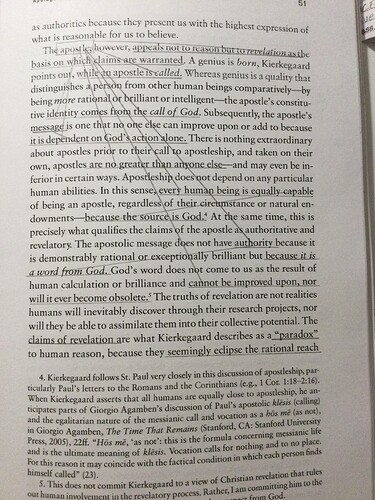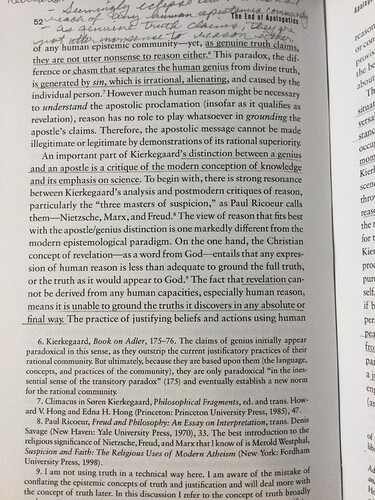RESOURCES FOR BACKGROUND CONCEPTS, DEFINITIONS, ETC.
Last edited: 9/14/2022
Back to OP
I’ll add to this list as I put my finger on things that may be useful to folks who want some background or definitions. I’ve looked up much reading this book and will continue to.
Cultural Periods/Historic Eras (Premodern, Modern, Postmodern)
1.6 Cultural Periods – Understanding Media and Culture.
I find the table on this page a helpful quick reference. The author’s commentary is mostly helpful for an explanation of his decision-making process in developing the table.:
http://www.darc.org/connelly/religion5.html
Enchantment
@jpm shared these blog posts about enchantment
End
The book title, The end of Apologetics, has a double meaning. It is, in part, a reference to the Westminster Shorter Catechism, Q.1:
Q. 1. What is the chief end of man?
A. Man’s chief end is to glorify God and to enjoy him forever.
Kierkegaard:
About Kierkegaard–
Kierkegaard in 19 Minutes (recommended by @MarkD ) https://youtu.be/RtlwWMJILBA
Kierkegaard: A Very Short Introduction by Patrick Gardiner
Provides a good, expanded Cliff’s Notes intro to Kierkegaard, including a brief biography; a Kondensed Kliff’s Notes overview of philosophers who influenced his work, particularly Kant, Hume, Hegel, Feuerbach, and Schleiermacher; an overview of main streams in Kierkegaard’s thought and in particular as expressed in his major works. It’s well-written and accessible. A good place to establish some hooks for further reading of works by the man himself.
Kierkegaard’s Concept of Irony
Timestamps 00:31 (What is irony?), 02:26 (Philosophy begins with doubt.), 07:11 (The Philosophy of Socrates), 11:20 (The phenomenon is not the essence); 12:44 (The highest form of irony), 16:11 (The Dark Side of Irony), 16:49 (The difference between irony and other phenomena), 19:17 (The Ironic Subject), 24:13 (Controlled Irony).
https://medium.com/@andrew.michael.kirk/how-to-begin-reading-kierkegaard-9682d17dd54c
By Kierkegaard–
Penner, Myron B.
@Mervin_Bitikofer shared this excellent introductory interview with Penner about the book.
@heymike3 shared this article by Myron Penner
The Unknown Mover (Or, How to Do “Natural” Theology in a Postmodern Context): A Review Essay
Sermon videos list from St. Paul’s Anglican Church,
https://www.stpauls-anglican.ca/podcasts/media
@Mervin_Bitikofer shared this *Unbelievable* podcast interview between Myron Penner and Sean McDowell.
Postmodernism
Postmodernism from PBS’s Faith and Reason Glossary (recommended by MarkD)
https://www.pbs.org/faithandreason/gengloss/postm-body.html
Postmodernism in a nutshell
An excellent “Cliff’s Notes” level blog that provides some basic touch-points to Postmodernism.
The introduction to this extended essay provides a good overview:
https://plato.stanford.edu/entries/postmodernism/
FOR FURTHER READING IN POSTMODERNISM AND CHRISTIANITY
Bibliography
A bibliography to the book The End of Apologetics, prepared by Kendel Darragh, is available here as a PDF: https://drive.google.com/file/d/1yAsx9DQRYjuW9kvuOngCTqnOKcz_gwwV/view?usp=sharing .
Books
Butler, Christopher, Postmodernism: A Very Short Introduction, Oxford University Press, 2002. (recommended by @heymike3 )
Smith, James K. A., Who’s Afraid of Postmodernism?, Baker Academic, 2006.
Taylor, Charles, A Secular Age, Harvard University Press, 2018.
Missing Pages (51 and 52) from Internet Archive’s PDF of The End of Apologetics:


